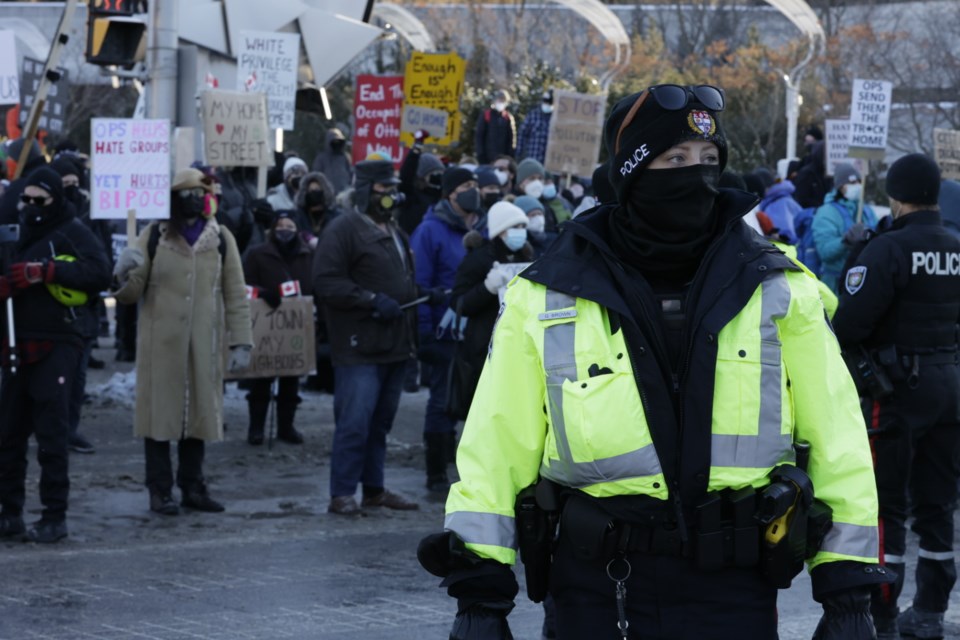One of the many questions that need answering in the aftermath of the various occupations in Coutts, Emerson, Windsor and Ottawa is about the police. In fact, there are many questions about police and policing that need to be answered.
There’s an incongruity that Canadians have had trouble reconciling. Where are the police that “kettled” everyone in downtown Toronto during the G20? Where are the police that roust homeless encampments with clinical detachment? Where are the police that answer Indigenous occupations in the middle of nowhere with flash-bangs, night sticks, and military-style tactics?
First, let’s be clear that state-sponsored violence should never be the answer. Ever. I don’t care what your politics are, but the answer to a protest should not be the business end of a blunt object, or something worse.
But we’re left with that incongruity. Why do the police seem so powerless when it comes to dealing with the Freedom Convoy, in need of advanced policing powers from multiple governments before acting, and why do they need no additional encouragement before dealing with other political activism?
My suspicion is that marginalized and racialized people in Canada know the answer to this, just as they know that the blockade at the Ambassador Bridge was cleared out with relative swiftness because precious economic capital was at stake, and not because of any particular threat to public safety.
That brings us to the essential question about policing in this, and just about any other circumstance: Who do the police work for?
This question has come up repeatedly, multiple time and at multiple levels, over the last few weeks. Ottawa Mayor Jim Watson and Ontario Premier Doug Ford have both made separate statements that say something to the effect of they do not control the police, and they’re right.
In a democracy, it’s important that a police service acts on the law, and not on the political whim of a particular government, or political ideology. That’s a matter of philosophy though, and most people don’t think about the governing principles of our power structure, they just want to know who to blame.
So who do the police work for?
The people in Centreville in downtown Ottawa don’t think the police work for them. Marginalized and racialized people have long suspected, and have often received confirmation, that the police are not their allies.
The only thing that’s changed in the last couple of weeks is that a majority of middle-class white Canadians have joined that chorus after seeing police standby passively as people are threatened, property is damaged, and horns blare all through the night in the nation’s capital.
While the circumstances are not as dire here in Guelph, I have long wondered who the Guelph Police Service answers to.
I recall the summer of 2020 when it was reported that the Guelph police held the member of parliament for a nearby riding in custody overnight on pretty serious charges and never disclosed it. The following political scandal was met with a stern rebuke by the service, they put out a tersely worded press release that ended with the note to stop asking questions on this matter.
Excuse me, but the police don’t get to decided what question they get to be asked while being held to account. They can say, “No comment,” but we’re allowed to ask.
Late last fall, the Guelph Police Services Board passed a motion to request reimbursement from the University of Guelph for the costs of extra policing during Homecoming and the Safe Semester program. Strangely, I have yet to see city council hold a debate about his motion. The police board essentially proposed a new tax on the U of G, or more likely U of G students, and council has had nothing to say on the matter?
And on the street, there are questions. I remember a Saturday last November when community members marching in solidarity with the Wet’suwet’en hereditary chiefs had a police escort made up of several patrol cars, and then, not 30 minutes later when over 100 anti-mandate protestors gathered in front of city hall, there was nary a police car to be seen.
Now I don’t say any of this to cast aspersions or anything, but it’s not inappropriate to ask the question if police treat protests differently depending on who’s leading them, and what issue they’re protesting. Why do expressions of Indigenous outrage get a high-level of police scrutiny, while expressions of outrage about public health measures get almost none?
Again, depending on where you’re coming from, you may already think you know the answer, which is why police need to be better prepared for questions when they’re not 100 per cent transparent, or when it appears that they’re not applying the law equally.
I think when it comes to brass tacks, we can all agree that a mayor or a premier directing the police is not the best idea in the world regardless of their politics, but at the end of the day, police are answerable to the government, and to the people, and if we have questions, they need to provide answers.
